ARC Review of Gilded Cage
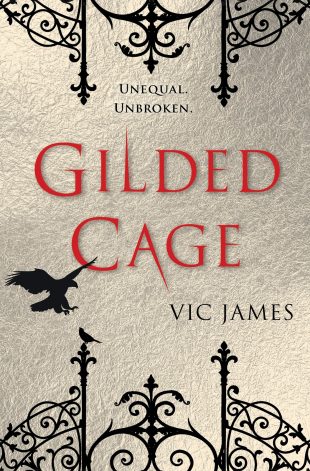 Gilded Cage (Dark Gifts, #1) by Vic James
Gilded Cage (Dark Gifts, #1) by Vic James 
Series: ,
Published by Del Rey Books on February 14th 2017
Genres: Fantasy, Young Adult Fiction
Pages: 368
Source: Netgalley
Amazon
Goodreads
FTC Disclosure: I received a complimentary copy of this book from the publisher via Netgalley. All opinions are my own.
Goodreads Synopsis:
Not all are free. Not all are equal. Not all will be saved.
Our world belongs to the Equals — aristocrats with magical gifts — and all commoners must serve them for ten years. But behind the gates of England’s grandest estate lies a power that could break the world.
A girl thirsts for love and knowledge.
Abi is a servant to England’s most powerful family, but her spirit is free. So when she falls for one of the noble-born sons, Abi faces a terrible choice. Uncovering the family’s secrets might win her liberty, but will her heart pay the price?
A boy dreams of revolution.
Abi’s brother, Luke, is enslaved in a brutal factory town. Far from his family and cruelly oppressed, he makes friends whose ideals could cost him everything. Now Luke has discovered there may be a power even greater than magic: revolution.
And an aristocrat will remake the world with his dark gifts.
He is a shadow in the glittering world of the Equals, with mysterious powers no one else understands. But will he liberate—or destroy?
My Review:
Vic James’ debut novel Gilded Cage is a novel that I’ve been looking forward to reading for months now. The premise – that a form of slavery is alive and well in England and that the ruling class uses magic to keep this unfair, dehumanizing system in place – intrigued me from the moment I first read the book’s synopsis and so I couldn’t wait to get my hands on it. Thanks so much to Netgalley, the publisher, and Vic James for providing me with an e-galley of Gilded Cage in exchange for my honest review.
So, what did I think of it? Well, honestly, my thoughts about Gilded Cage are a bit all over the place. There were definitely plenty of things I liked about the book, but that said, I also encountered a few problematic areas.
Let’s start with the good.
What I Liked:
Slavery vs. Rebellion: I was intrigued by the class-based society where magic-wielding “Equals” ruled over a non-magical citizen body and where each member of the non-magical citizenry is required to submit to a decade-long period of servitude called ‘Slavedays.’ While serving a Slavedays term, an individual basically relinquishes all of his or her legal rights as a citizen and becomes a slave to the Equals until your ten years are up. The concept of the Slavedays was quite fascinating because although the decade-long sentence of slave labor is mandatory, each citizen is able to choose when they serve their sentence. Some choose to serve fresh out of high school or college, while others choose to postpone it as long as they can. Families, if at all possible, are also allowed to serve their sentences together, and even if it’s not possible to keep all family members together, young children are required to be kept with a parent.
James’ readers get to see Slavedays up close and personal as we are introduced to some of the novel’s main characters, Luke and Abi Hadley, as they and their family members prepare to enter their Slavedays. Older sister Abi has deferred her acceptance to medical school to go ahead and serve her sentence and, as part of her deal, has managed to secure her family a pretty decent gig serving out their Slavedays at Kyneston, a magnificent estate owned by one of the most prominent Equal families in England, the Jardines. Compared to the alternative, a grungy, smog-filled industrial city called Millmoor, Kyneston sounds like a dream. Things don’t go according to plan on the day they are supposed to depart for Kyneston, however, when what appears to be a clerical error separates Luke from the rest of the family and he is sent by himself to Millmoor. We thus get to see both Millmoor and Kyneston as we follow both Luke and Abi on their very different journeys into Slavedays.
As expected, Millmoor is pretty much a nightmare filled with cruel supervisors, back-breaking labor, unhealthy food, and just an overall demoralizing atmosphere. What I liked about seeing the inside of Millmoor though was that the reader is immediately presented with covert signs of rebellion. I was so glad to see this because up until this point, I had been sitting here thinking “Why the heck are these citizens just voluntarily giving up ten years of their lives, selling off their homes and possessions, just because some uppity ruling class says that’s the way it is?” It was great to see that some folks weren’t just lying down and taking it without offering any kind of resistance. As Luke joins the resistance, we get to see more and more brazen acts of defiance and it’s pretty exciting to read and root for this band of underdogs that Luke has joined up with as they are clearly gearing up for a rebellion.
In contrast to the horrendous living and working conditions Luke and his fellow Millmoor inmates are subjected to, Abi and her family are given fairly nice housing to live in at Kyneston, ample food to eat, and their workloads are quite manageable as well as respectable, especially considering they are serving the same kind of sentence Luke is. Abi works as an administrative assistant to one of the Jardine brothers, her mother works as a nurse for an elderly family member, her father does maintenance work on vehicles on the property, and little sister Daisy is providing child care for Gavar Jardine’s daughter. Apparently all Slaveday terms are not created equally.
Politics: In addition to seeing that Slavedays is quite different depending on where you are assigned, we also get to see the flipside of things as we follow Abi and the rest of the family into the heart of Equal society and all of its political games. I’m a bit of a political junkie anyway so I found the goings on within the Equals’ ruling body to be quite fascinating. There are apparently a lot of ambitious and ruthless people within the Equals. There are power plays to be Chancellor, a small but vocal faction who supports the abolition of Slavedays altogether, and all sorts of other exciting things at play as Parliament is in session. If you’re into reading about politics and all of its behind-the-scenes machinations, there’s definitely a lot for you to enjoy in Gilded Cage.
Cloak and Dagger: I also really liked how James kept me guessing as to what side many of the characters in Gilded Cage were even on. It was never safe to assume any particular character was pro- or anti- slavery just based on their standing in society. There were several jaw-dropping surprises throughout the novel as it became clear that the rebels weren’t necessarily who I thought they were.
What Didn’t Work for Me:
Too Many Points of View: Where I’m somewhat conflicted about Gilded Cage has more to do with how the book is structured and the lack of explanation about certain key elements. First of all, there are so many points of view that without the book’s synopsis singling out three characters, I really had a hard time distinguishing who the main characters were supposed to be. You have the points of view of several members of each class – Abi and Luke, who are regular citizens beginning their period of servitude, and then you have several points of view from those who are considered Equals, such as Silyen and Gavar Jardine, who are brothers in one of the most prominent Equal families. While it was definitely interesting to see the class dynamic and the rebellion from both sides, it just made for a confusing time trying to keep track of everyone and it also made it hard to really connect with any of the characters.
Why Are Characters Doing What They’re Doing?
Characters’ motivations also weren’t clear to me. Aside from the general wrongness is the idea of mandatory servitude, why is Luke so quick to jump on board with the rebellion? Even though we’re in his head seeing what he’s doing from his point of view, there is still no real explanation for why he starts participating. It’s basically just one minute he isn’t, the next he is.
There were similar instances with the Jardine brothers as well. Silyen is, by far, the most fascinating character in the book and all of his schemes are so intriguing. He almost appears to be playing both sides against the other, but it’s not entirely clear why he’s doing what he’s doing. Is he truly an abolitionist even though he’s an Equal? Is he trying to create chaos and disruption so as to stage a power play and overstep his older brother to become his family’s heir? I’m hoping all of this will be become clear in the next book because I definitely found Silyen to be the most interesting character in Gilded Cage.
Abi’s Inappropriate Flirtation:
So those who regularly follow my reviews know I’m not big on romances randomly being inserted into a storyline where it’s unnecessary. To James’ credit, it does take a back seat to the rest of the action of the story but it’s still there so I have to comment – mainly because again, her motivations are unclear. Abi works very closely with one of the Jardine sons and becomes attracted to him. First of all, it’s not appropriate since it would basically be a master-slave relationship. Second, she is supposed to be working diligently to try to get her brother out of Millmoor and back with them, so why is she sitting around letting herself get distracted by a cute boy?
I’m all about strong female characters so in this sense, Abi was kind of a letdown if she really is supposed to be one of the main characters. She does do something risky and heroic at the end of the novel though so I’m hopeful this means she will step up and be the strong character I want her to be as the series continues.
The Verdict:
All in all, I found Gilded Cage to be an entertaining if somewhat confusing read. With a few of the kinks worked out regarding point of view and starting to explain why some of the characters are behaving as they are, it’s got the potential to be a great series.
Rating: 3 Stars


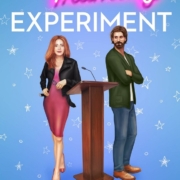
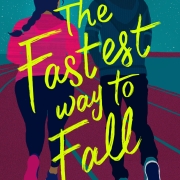
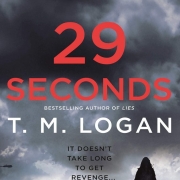
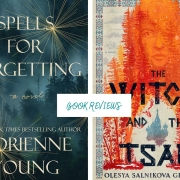



I started reading this book and got bored, so I put it down and haven’t picked it up since. Your review does make me curious about it though. Thanks for sharing your thoughts! 😀
Brittany @ Brittany’s Book Rambles
Yes, I’ll agree that it’s a slow build to where it gets really interesting. Once it gets going though, it’s a pretty good read, even with the few issues I had with it.
Reading a book with too many points of view can really mess things up for you, especially when they all sound somewhat similar and you end up forgetting who is narrating the story. I’ve seen a lot of people saying that this a big issue with this book. It definitely does sound like a great read, especially the whole rebellion aspect. Great review!
Yes, I think the series still has great potential, especially if the author chooses to go with fewer points of view in the second book.
This does look interesting, and I like the sound of the surprises in terms of who is who and what side they’re on. The multiple POV’s can be hit or miss, sorry to hear it was a little unclear here. It does sound like it has a lot of potential.
Yes, I still have high hopes for the next book in the series, although I am really hoping the author either cuts down on the multiple POVs or else makes them a little less confusing.